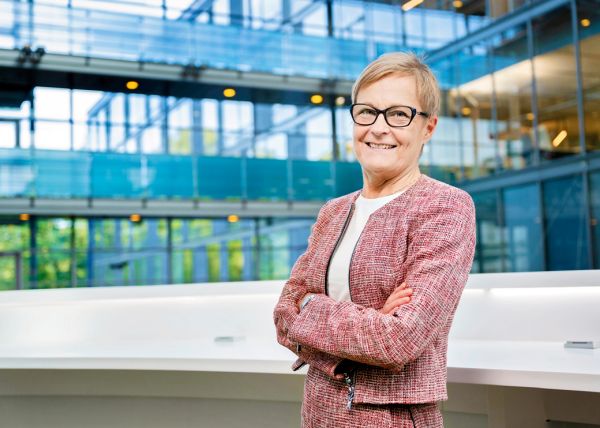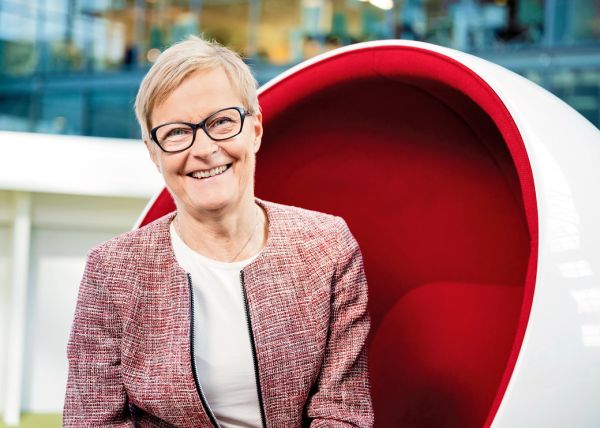
Business Finland’s Director General Nina Kopola: Research and business cooperation in demand
Nina Kopola celebrates the fact the research, development, and innovation funding act offers a chance to invest in long-term research. This serves the development of the whole society and bolsters national continuity.
Text minna hiidensaari images aleksi poutanen english translation marko saajanaho
35th in the international ranking. That is hardly something to break out the bubbly for. Said ranking is from a 2019 study investigating the total business and government funding for research, development, and innovation in relation to the country’s gross domestic product.
“Finnish companies do not innovate as radically as their foreign counterparts. This is especially evident from the collapse of cooperation between higher education research and business”, says Business Finland’s Director General Nina Kopola.
That exact cooperation is exactly what Kopola believes is required. In a Finnish Union of University Professors seminar on science policy in the coming parliamentary term, she noted that information produced by higher education research and the expertise of PhD students are crucial for developing our society. New businesses, innovation, and networks to encourage these are needed in order to bring sustainable economic growth and competitiveness. Investment in research and development is practically the only method of increasing work productivity. That does not happen by increasing working hours. This means a union between businesses and research institutions is in demand.

Kopola has had a long career in international business, giving her an extensive perspective. From 2011 to 2018, she was CEO of publicly traded company Suominen Oyj and has also served on the Ilmarinen, Konecranes, and Metso boards of directors. Since 2019, she has been the Director General of Business Finland.
“Cooperation between universities and businesses would bring effectiveness, new information and new jobs.”
Research funding cut effects only evident after delay
Kopola specifies that cooperation and research emphasis do exist, the amount has simply shrunk. For example, OECD country statistics indicate research used to be more common. As recently as 2009, Finland’s public research and development funding was 1.18 percent of the GDP. That was enough for second place in the OECD country rankings. Currently, Finland sits in 6th position on that list.
The current situation is a sum of several factors. The Director General thinks national political decisions were a large nail in the coffin.

“The Sipilä government heavily reduced RDI funding in 2016. I am not saying that was right or wrong. Of course, nobody wanted to cut costs”, she articulates.
Kopola notes costs simply had to be cut somewhere, and one major victim of this was research funding. The delayed consequences can be seen in the lack of patience, stability and predictability of research funding. As the amount of funds on hand has decreased, research has become increasingly tentative in terms of content. The conditions have not been ideal for new growth driven by boldness. The current global situation adds to the uncertainty around business and research.
“However, just lying down and giving up is not going to help.”
Exceptional law devised to last across parliamentary terms
In 2021, the parliamentary working group beginning to prepare the RDI Act decided this act would be a tool that lasts across parliamentary terms, and commitment would not be dependent on the will of the parties in power.
The new government has got its work cut out with the economy and money-savers, but there is a legal obligation. An objective outlined in the RDI Act is to ensure a steady increase in government RDI funding until 2030. In an exceptional display, the parliamentary parties are committed to increase research and development expenditure to four percent in relation to GDP by the year 2030. The public sector is meant to cover a third of the funding, with the private sector contributing the remaining two thirds.
Kopola celebrates the stability-promoting nature of the legislation.
“The act sends the message that the government wants to invest in research. The new government has also communicated their desire to commit to the RDI Act.”
“The act sends the message that the government wants to invest in research.
Nina Kopola, Director General, Business Finland
According to Kopola, conveying this message is imperative to ensure trust in continuity in both businesses and research institutions. That also helps bring about the courage to invest in research and joint projects. She hopes the RDI Act will help the perception within higher education institutions that quality independent academic research is allowed.
The combined strength of the large and small
Measured in absolute terms, Finland simply has fewer RDI euros at its perusal than larger countries such as Germany or France, let alone the United States. Kopola states that focusing is a more reliable way to growth.
“We should have a few themes because Finland is a small country. We could use the green transition and digitalisation as our spearheads. In addition, funding could also be granted on an ad hoc basis.”
”We could use the green transition and digitalisation as our spearheads. In addition, funding could also be granted on an ad hoc basis.”
Kopola emphasises that despite Finland being a small country and market, its size, tight-knit networks, and teamwork culture give us strong innovation ecosystems. Our businesses and research institutions cooperate more, whereas internal one-upmanship is more common in larger countries.
“We have trust in each other.”
According to Kopola, ecosystems with multiple players, both big and small, are known as fertile platforms for growth and found interesting even by foreign investors.
“We work in close cooperation with the Academy of Finland to ensure our financial instruments complement each other. For example, much of the funding granted by Business Finland goes towards joint projects between multiple actors”, Kopola stresses.
The Business Finland funding model puts an emphasis on effectiveness. Profit is expected in return for the euros granted.
”For example, much of the funding granted by Business Finland goes towards joint projects between multiple actors.”
“Despite this, not all businesses receiving support are startups or large enterprises looking for scalable growth”
For example, approximately a fifth of all innovation funding granted by Business Finland in 2022 went to small and medium enterprises.
Currently, the share of SMEs in funding applications received by Business Finland is clearly reduced from before. The compounding effects of the pandemic and the war have caused a liquidity crisis at many businesses. This is another reason why we need faith in the future.
Connecting through problem-solving
The Business Finland Director General also notes that high-quality research and ensuring the growth related to that research bring with them the extra dimension of attracting international experts to Finland. The stability and safety of Finland are attractive.
“We are also an easy, stable, and reliable country for families.”
One problem in Finland is that PhD students are not employed at businesses. Kopola hopes businesses would understand that producing scientific information does not hurt the bottom line. If anything, it is the other way around. As a researcher highlights deeper perspectives and discoveries, it might sprout into new inventions.
As a researcher highlights deeper perspectives and discoveries, it might sprout into new inventions.
She offers a reminder that money alone is not enough. A culture of initiative, doing, and conversation must be actively encouraged. A constant dialogue is needed.
Kopola encourages academic actors to seek out dialogue with businesses and recognise common themes and questions. For example, themes important to both parties might offer topics for dissertations.
“Get out there, talk to them and find out if the business might have a problem researchers could help with.”
Nina Kopola
Master of Science (Technology), Licentiate of Science in Technology, Åbo Akademi Honorary Doctor in Technology
Born: 1960 in Helsinki, Finland
Work: Director General of Business Finland, CEO of Suominen Oyj,
Marketing Manager at Dynea, several board positions prior to current post
Family: Husband and two adult children
Hobbies: Pilates, hunting
What are you known for in your work community? Described by coworkers with the words “people-oriented”, “reformer”, “international career”, “visionary”. Being the only female CEO of a public company for a long time.
What are you not known for? Living in France on three separate occasions and earning a Diplôme d’études approfondies postgraduate degree.

